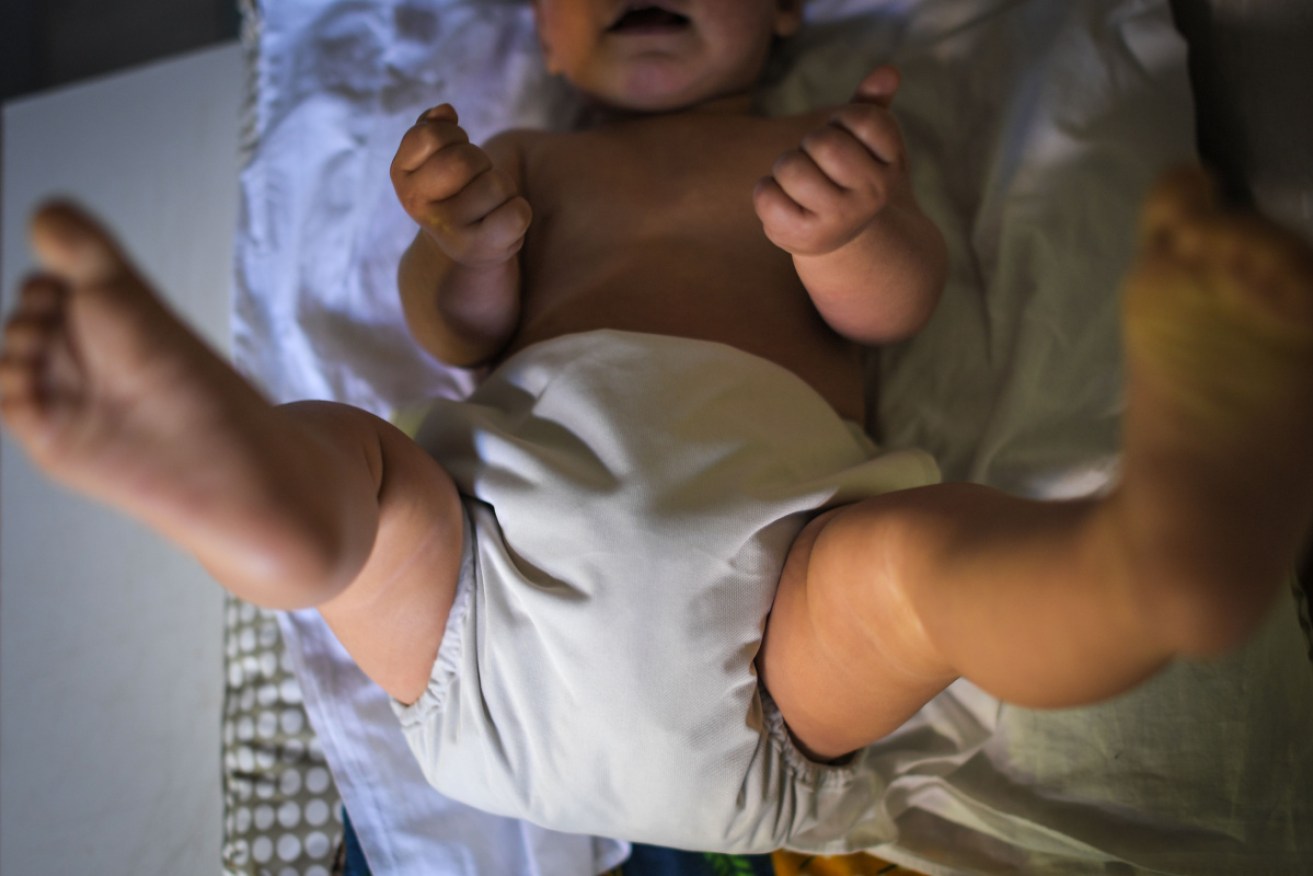Newborn fat-shaming: Study finds link between first poo and later weight gain


The gut health of a newborn can predict a variety of health problems down the track. Photo: Getty
When a baby is born, the parents will stare at its squashed-up little face and look for signs as to whom it will resemble in the future.
Now Finnish researchers suggest a more important and accurate prediction can be made: Simply by turning that same baby upside down and looking inside its nappy after it squeezes out its first poo.
The scientists have found bacteria living in that treasured, tar-coloured portion of muck – known as meconium – are able to predict if your little darling might not be so little at the age of three.
That is to say … fat
The study, led by Dr Katja Korpela of the PEDEGO Research Unit and Medical Research Centre Oulu, University of Oulu, aimed to determine the association between the early intestinal microbiome (population of gut bacteria) and the subsequent growth and weight gain of children up to the age of three.
According to a statement from the researchers, the early microbiome is important for the maturation of the gut and subsequent metabolic programming.
The latter is a process of early adaptations to nutritional stresses or stimuli, which permanently change the physiology and metabolism of the child.
An association between the administration of antibiotics during infancy, and the likelihood of a child later being overweight had been observed in previous epidemiological studies, suggesting that changes to the early microbiome could have long-lasting effects.
Link found but not understood
The team checked the excrement of 212 babies after being born, and again after one year, and noted babies who later became overweight had a relatively higher abundance of bacteroidetes phylum (a large group of bacteria found in a wide range of environments, as well as in the gut and on the skin of many animals) than their peers who were an average weight.
Additional research is needed to explain why this is so – and how it might facilitate weight gain.
The chubby-bubby research was presented at the annual European Congress of Clinical Microbiology & Infectious Diseases in Amsterdam.
There is no paper published yet, and so the work is not yet peer reviewed – because who wants their name attached to fat-shaming toddlers?
Previous research has found that the health and makeup of infant gut bacteria is a predictor for later wellbeing.
Allergies, asthma and cognitive problems
In 2016, University of California researchers found the microbes living in a baby’s gut during its first month of life probably directly affect the developing immune system, leading to a higher risk of allergies and asthma later in childhood.
The researchers discovered the guts of neonates with healthy microbiomes contained a wide range of molecules that can reduce inflammation. These include a set of fat molecules, or lipids, which researchers suspect nourish immune cells called T-regulatory cells, whose job is to keep the rest of the immune system in check.
In contrast, these key anti-inflammatory lipids were absent in the guts of at-risk babies. Instead, the researchers detected different fats, including one associated with asthma in adults.
Further experiments found that even healthy, adult immune cells became sensitised after being exposed to just the by-products of the at-risk babies’ gut microbiomes.
The researchers suspected that gut microbes play a key role in processing dietary components such as fats, giving them a powerful influence over whether anti-inflammatory or pro-inflammatory molecules end up in the gut.
In 2015, Case Western Reserve University, in Cleveland, Ohio, scientists reported a newborn’s first stool can signal that the child may struggle with persistent cognitive problems.
In particular, high levels of fatty acid ethyl esters found in the meconium from a mother’s alcohol use during pregnancy can alert doctors that a child is at risk of problems with intelligence and reasoning.
Baby poo story has a happy ending
On the upside, last August, scientists at Wake Forest School of Medicine, in North Carolina, said they had developed a probiotic “cocktail” derived from gut bacteria strains found in infant faeces that may help increase the body’s ability to produce short-chain fatty acids, which are a key component of good gut health.
People with diabetes, obesity, autoimmune disorders and cancers frequently have fewer short-chain fatty acids.
The researchers suggested increasing them may be helpful in maintaining or even restoring a normal gut environment, and hopefully, improving health.
So there you go, newborns: You have reason to feel good about yourselves.








